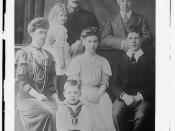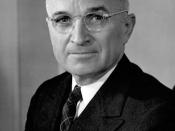The allied victory over German and Japanese forces in World War II did not bring an end to world conflict. Instead, the once allied powers of the US and USSR engaged in a struggle unlike any other that would last for more than fifty years. This war, known as the Cold War, began immediately after Hitler and his allies were defeated and conflicts arose between the two major powers. Stalin influenced and rallied the Soviets by blaming the world war on international capitalism and implied that no commercial equilibrium between capitalism and communism could ever be reached. Soon, Europe was split into two regions differing in governments, policies, and even militaries. Some nations like Greece, Turkey, and Korea erupted in civil wars and prompted Harry S. Truman and the United States to take a firm stance against the USSR. Although some Americans like Henry A. Wallace believed that peace could be reached without the efforts of the Cold War, most agreed strict action was needed to secure national and world security.
The Cold War was fought unlike any other war the US has seen. It was not an intense physical battle between the US and USSR, but rather a very political and diplomatic strategy was used to influence other nations and gain an edge on the Soviets. When Truman decided on his firm stance against communism, and Britain came for support in Greece, he gave a speech indicating his concern for foreign policy and the national security of the US. Truman stated that the rebellious acts by terrorists in Greece were influenced by Soviet expansionism and aid must be provided for the Greek Government. Along a large sum of money, the US provided supplies, equipment and assistance to the Greeks.
Another important action point of Truman's speech, which became known...


